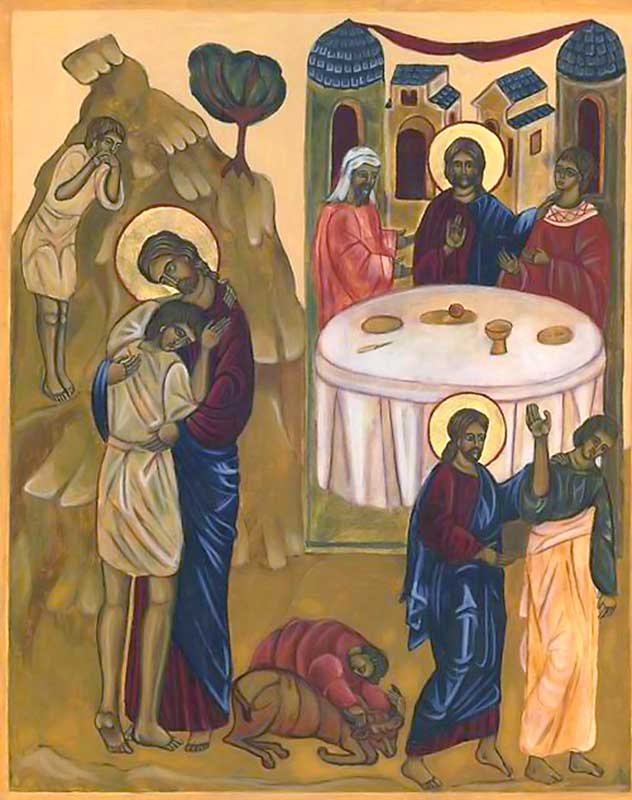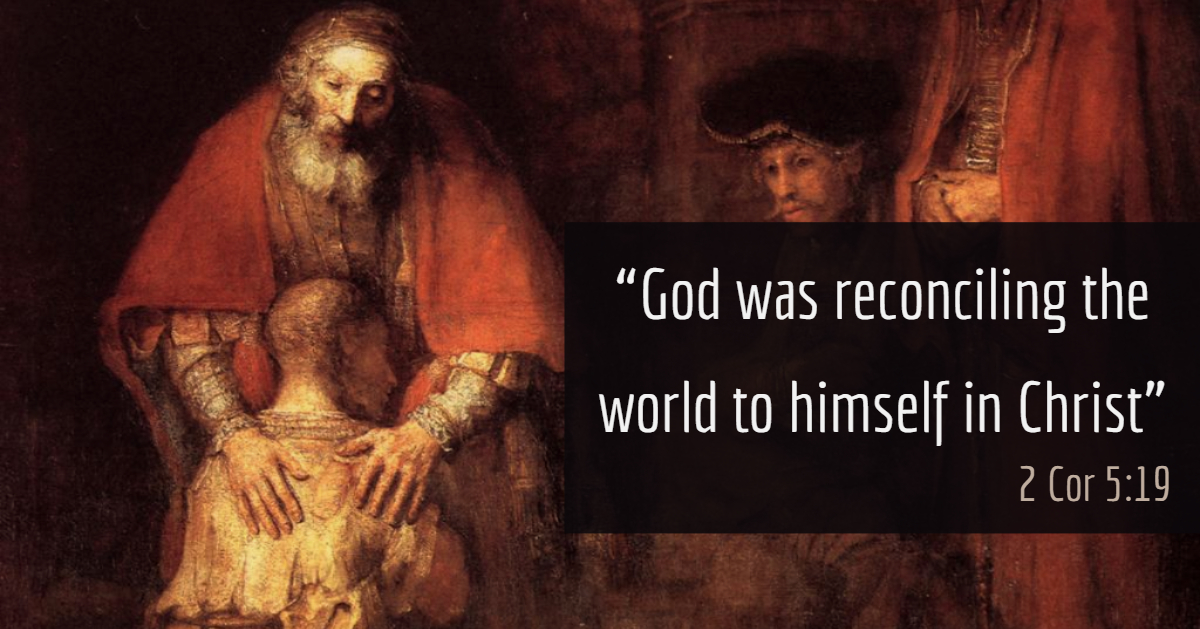The Ministry of Reconciliation
4th Sunday of Lent (C)
The fourth Sunday in Lent is called Laetare Sunday, after the first word of the Entrance Chant for the Mass. Laetare is Latin for “rejoice.” The Entrance Chant is from Isaiah 66:10-11: “Rejoice, Jerusalem, and all who love her. Be joyful, all who were in mourning; exult and be satisfied at her consoling breast.“
We don’t normally think of Lent as joyful. It’s a penitential season, and we typically think of penance as expressing sorrow for our sins. But that’s only part of the story. Sorrow for our sins should cause us to turn toward God which is an occasion for great joy. It is appropriate, therefore, that the Church takes time in the middle of this penitential season to remind us to be joyful.
Ministry of Reconciliation
In our second reading this week, St. Paul neatly sums up the Christian faith in one sentence: God has reconciled us to himself in Christ (1 Cor 5:18). Paul then speaks of the “ministry of reconciliation” that Christ entrusted to the Church.
“And all this is from God, who has reconciled us to himself through Christ and given us the ministry of reconciliation, namely, God was reconciling the world to himself in Christ, not counting their trespasses against them and entrusting to us the message of reconciliation. So we are ambassadors for Christ, as if God were appealing through us.
2 Cor 5:18-20
We implore you on behalf of Christ, be reconciled to God
When Catholics hear the word “reconciliation” we immediately think of confession, which is also called the sacrament of reconciliation. But reconciliation is more than just one sacrament. It is the Church’s entire purpose. Christ came to reconcile us to God and the Church’s ongoing mission is to extend that ministry of reconciliation to every people and generation.
Harmony
Reconciliation involves bringing two things together, but not in a forced or artificial way. I can take two very different objects, like a hammer and a flower, and wrap them together in duct tape. I have joined them together, but not in any meaningful way. Our reconciliation to God is not like that. It is not the artificial bringing together of two unlike things.
To be reconciled requires finding harmony and agreement. Something most people do every month is reconcile their financial accounts with their bank statements. They want to make sure they agree with one another. If they don’t, something is wrong. Reconciling the accounts means finding the error and correcting it so that there is agreement.
When I discover an discrepancy in my checking account, the mistake is usually on my end. The bank is rarely at fault, because they are better at keeping records than I am. Likewise, when it comes to reconciling our lives with God, we know God’s never going to be the one in error. We have to change to bring our lives into harmony with God; which is to say into harmony with goodness, love, and truth.
This reconciliation is a ministry and not just a one time event. It’s an ongoing process by which we become more like God. It involves repenting from our sins, not just once or twice, but every time we realize that we’ve done something not in accord with a Godly life. Taking advantage of the Church’s ministry of reconciliation means we must never grow weary of bringing our lives back into union with God.
A Rejoicing Father
The great gift of reconciliation that Christ has won for us is why we should never despair over our sins, because God is always eager to forgive. Nowhere is this illustrated more clearly than in the parable of the Prodigal Son, which is given to us in this Sunday’s gospel.
A son demands to receive his inheritance from his father (basically saying to his father, “I wish you were already dead so I could have your stuff”). Even though it’s an unreasonable demand, the father grants it. But the son is wasteful (that’s what prodigal means) with his new wealth and squanders it all. He ends up in a pig sty eating the slop given to the pigs, which is just about the worse situation a Jewish person at that time could imagine themselves in — pigs were considered to be the lowest of the unclean animals.
Having hit rock bottom, he repents of his mistakes and decides to return to his father. He knows he has done his father a great injustice so he has no hope of full reconciliation. He plans instead to beg his father to hire him on as a servant, knowing that even the servants in his father’s household have a better life than the one he has created for himself.
So he makes his way back home… and then look at the Father’s reaction when he sees him.
While he was still a long way off, his father caught sight of him, and was filled with compassion. He ran to his son, embraced him and kissed him.
Lk 15:20-24
His son said to him, ‘Father, I have sinned against heaven and against you; I no longer deserve to be called your son.’ But his father ordered his servants, ‘Quickly bring the finest robe and put it on him; put a ring on his finger and sandals on his feet. Take the fattened calf and slaughter it. Then let us celebrate with a feast, because this son of mine was dead, and has come to life again; he was lost, and has been found.’ Then the celebration began.

Did the Father stand off and wait for the son to come to him and beg for mercy? No. The Father saw him “while he was a long way off” — meaning the Father was looking for his son to return. And as soon as he saw his son moving in his direction he ran to meet him, embraced him, and kissed him! All this is before his son even utters a single word.
When the son does begin speaking, all he is able to get out is his admission of guilt. He never even has the chance to ask his father to hire him as a servant. Instead, the father immediately adorns his son with a robe and ring and sandals — all signs that he has been received not as a servant, but as the son that he is, restored to full status. Finally he calls for a feast to be prepared. “Then the celebration began.” The Father’s response to his son’s repentance is to throw a party!
This is how God responds whenever a sinner returns to him. We can separate ourselves from God by our sins, but God is never far off. He’s always looking for us to make any sign of return. And when we do, he runs to meet us, wherever we are. He is eager to receive us back, not as servants, but as sons and daughters. He longs to put his robe on our shoulders and his ring on our finger. Each time a penitent makes a good confession, it is a cause for celebration! If only we could see how the angels and saints rejoice in heaven each time we confess our sins and are reconciled to God, we would never shy away from this great sacrament of mercy and love.
Making a return to God is certainly cause for us to rejoice. But it’s good to remember that God also rejoices. In fact, because he loves more purely and more intensely than we do, he rejoices more. And even if the shame we feel for our sin makes us a bit hesitant to approach him, all we need to do is take that small first step of walking into the confessional, and he’ll always run to meet us with an eager heart and open arms.

